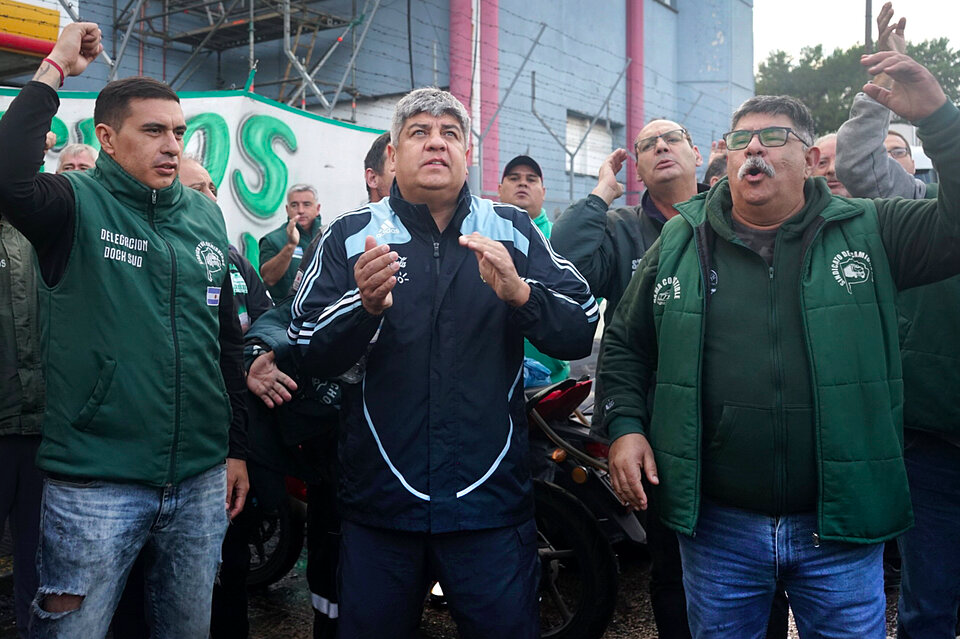
Published 05/07/2024 18:32 | Edited 07/05/2024 20:09
Javier Milei’s government may minimize it, but the General Strike called by Argentina’s main unions (CGT and the two CTA) for this Thursday is becoming increasingly mobilized. Throughout the day, several unions announced their support for the national strike, scheduled for May 9th. Among them, train, bus and metro unions have already confirmed their participation in the forceful measure, essential to guarantee the interruption of the movement of people.
Pablo Moyano, one of the leaders of the CGT, declared that “the general strike will be forceful”, while Héctor Daer stated that it will be “a big stoppage”. The mobilization is not just limited to street demonstrations, but also aims to send a direct “message” to senators to reject the Basic Law and fiscal package projects, which have already received half-sanction in the Chamber of Deputies.
“The general strike is a message to senators from other blocs who have not yet decided. We demand that they do not vote on the Basic Law”, highlighted Moyano during an assembly of workers of the Argentine Confederation of Transport Workers (CATT), which brings together several unions, including truck drivers, railway workers, taxi drivers and bus drivers.
The mobilization also seeks to pressure the National Congress to reject the harmful DNU 70/2023 and the omnibus law, which have faced resistance in the Upper Chamber. Union leaders have been meeting with senators from different blocs to ensure support for the cause.
Meanwhile, aeronautical unions held assemblies to repudiate the bills and the attempted privatization of Aerolíneas Argentinas. The announcement of the strike led the company to develop a contingency plan to minimize impacts on flights. “We are telling the senators that they are voting against their own interests, they are voting for the provinces to stop having air flights every day,” said the leader of the Aeronautical Personnel Association (APA), Edgardo Llanos.
The unions’ announcement of support throughout the day is a tradition and serves as a show of strength against the government. This time, transport unions and other sectors announced their support for the strike, highlighting the importance of stopping laws that harm workers and national sovereignty.
The Argentine Union of Rural Workers and Dockworkers (UATRE), led by José Voytenco, joined the strike, as did the Federation of Workers of the Petroleum Industrial Complex, which warns that it is joining the strike against Milei, who “governs for the richest and punishes those of us who have formal jobs, informal jobs and work cooperatives, in addition to retirees.”
The national mobilization promises to be a milestone in the struggle of Argentine workers against measures that threaten their rights and working conditions, consolidating popular resistance in times of political and economic challenges.
Challenge to the strike
Today, the party in power opened the debate in the plenary of committees on the Basic Law and its fiscal package in the Senate, seeking to convert the pillars of Javier Milei’s government into law. However, it faces a complex path, with an uncertain outcome in the Upper House. The agenda proposed by the Casa Rosada aims to obtain a majority opinion by Thursday, May 9, in the midst of the strike, and then take it to a vote in the Senate plenary on the 16th, just before the May Pact proposed by Milei.
The confirmation by presidential spokesman Manuel Adorni that the Pact will be implemented on May 25th “with or without the Basic Law” highlights the difficulties that the Government faces in the Senate. With a first minority of the Unión por la Patria and the resistance of several governors with many articles of the libertarian package, the final result of the vote remains uncertain.
While the Casa Rosada pressures the governors to support the Basic Law and its fiscal package, the legislative strategy of the UxP interbloc, the main opposition group, is also underway. This ambitious and hasty agenda reflects the desperation of the ruling party to advance its legislative agenda.
Source: vermelho.org.br

